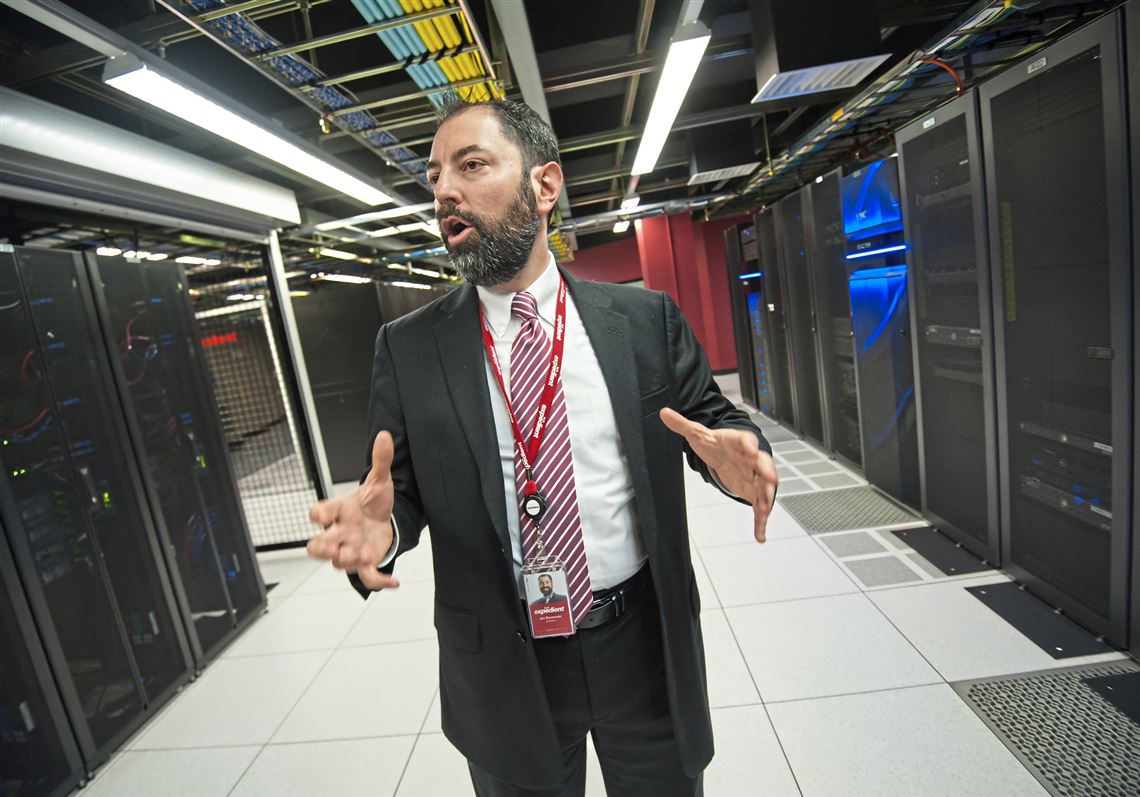At 26,000 square feet of operational space, it may as well be a Best Buy store.
But it smells like rubber, the air conditioners emit a whir like a fleet of airplanes and people aren’t allowed inside unless they place the back side of their hand into a biometric “hand geometry reader” for identification.
There is a nod to retail, though. The newly expanded Expedient data center is housed inside an old shopping complex — the former Allegheny Center mall, which has since become the Nova Place tech complex on Pittsburgh’s North Side. The existing infrastructure and central location keeps the cost low for a place that runs electricity 24/7, 365 days a year.
Though the rent was cheap, this old mall is quietly part of the tech infrastructure for the region.
“Most of the telecommunications fiber networks in Pittsburgh pass through this building,” explains Jonathan Rosenson, senior vice president for strategic initiatives.

People tour the hot/cold aisles of Expedient's data center computer room at Nova Place in Allegheny Center. The climate controlled space allows for the technology to be kept at its ideal temperature. (Pittsburgh Post-Gazette)
Eighteen months ago, $14.5 million in engineering and construction expanded Expedient’s total space at Nova Place to 40,000 square feet — not only creating a second 10,000-square-foot computer room for clients, but also a lobby, an administrative space and a spot for the data center’s four backup generators — each with a two-megawatt energy capacity (and 14,000 gallons of diesel fuel to run them).
On Thursday, potential new customers toured a space not typically open to the public for security reasons. Expedient tends to keep a low profile. Its clients prefer not to be named.
“Many of our customers in Pittsburgh aren’t from Pittsburgh because they want the computing workloads to be away from their businesses in case of a disaster,” Mr. Rosenson said. Expedient has 11 data centers across the eastern portion of the country, including another Pittsburgh center in Green Tree, one in Boston and two in Cleveland.
Half of the company’s customers use two or more data centers and another 20-30 percent use three or more to increase security and expand access to any physical servers. The company employs 110 people in Pittsburgh, ranging from technicians and engineers to a local sales team and electricians.
Using multiple data centers can increase a firm’s total operating costs, but it can also mean better service for that firm’s customers.
All physical systems experience some level of delay, or latency, when transferring data back and forth on a network, but some systems can become problematic when a business is not close enough to its data hosting center. And that, in turn, could mean HQ Trivia doesn’t load quickly enough or that your banking app doesn’t work.

A SlimLine Cage contains servers and network equipment at Expedient's data center computer room at Nova Place in Allegheny Center. Expedient designed the cage, which rolls up while providing security, to save space in the data center. (Pittsburgh Post-Gazette)
The first data center Expedient built in Pittsburgh amassed a total of 16,000 square feet for computer servers, storage and cloud computing infrastructure. It was completed in 2008, making the firm one of the first new tenants at the dead North Side mall.
Now the first computer space is more than 90 percent full, packed with data from at least 200 clients. Health care and finance constitute most of Expedient’s clientele, but total customers run the gamut.
Competition is mostly regional and includes the likes of Ascent Data in O’Hara, Chateau-based TeraSwitch Networks, DataBank in the North Side, Iron Mountain in Butler County, Larimer-based Management Science Associates, and Cogent in Upper St. Clair.
The cloud computing boom actually slowed the growth of data centers, Mr. Rosenson said. Cloud computing has allowed data centers to become more dense, hosting more customers in less space.
“When we manage cloud computing services, it’s a consistent workload. There’s similar types of hardware, service and network equipment. So we’re able to optimize and get efficiencies out of that,” he said.
In the past, clients more heavily relied on co-location — wherein a data center provides the space, air conditioning, power and security, but firms bring their own equipment.
“Think of it like self-service storage,” Mr. Rosenson said. “It’s not your building, but your stuff is in there.”
About 70 percent of Expedient’s new clients are in cloud computing sales, but half of the total business includes co-location services.

Analyst Derek Lear, 33, of Ross Township, checks out customer tickets as he works in the Operations Support Center at Expedient at Nova Place in Allegheny Center. Above him, security cameras show different rooms in the data center. (Pittsburgh Post-Gazette)
Mr. Rosenson couldn’t name particular clients, but he pointed to a particularly large section of the original computing room, which had a large, black cage around it to add an additional layer of security as an example of a co-hosting client. He said if you think of the major universities in the Pittsburgh region, most of them have a presence in the room.
The labyrinth of tall black lockers looks nondescript, save for the colorful wiring spilling out of the back of servers. Red and blue wires run to a long beam overhead. There lies the network. There lies the cloud.
Those colorful aisles are particularly warm, since heat is emitted from the back ends of the servers. The front sides of the long lockers are the cool rows, where air conditioning shoots out of the floor at temperatures in the mid-sixties to keep the entire space at 72 degrees.
Eighteen massive air conditioners sit around the perimeter of the room and electrical lines run below the raised floor. Combined, the air conditioners produce up to 500 tons of cooled air, or about 33 times as much as a one-bedroom apartment would require.
The power plant room is noisy. You can barely hear Mr. Rosenson explain that the humming sound, which is actually a vibration, is the power coming directly from Duquesne Light.
The monthly energy bill is on the low end of the six-figure range, he said.
Hosting services for clients start in the low thousands range, and can span to the hundreds of thousands, Mr. Rosenson said. And there’s room for more expansion in the future.
“Data only grows,” Mr. Rosenson said with a laugh. “It doesn’t stop.
“We have unlimited capital to expand the build, as long as we show a return on investment.”
Join the Tech.pgh Community!
Sign up for the free newsletter here
First Published: January 29, 2018, 12:00 p.m.
















